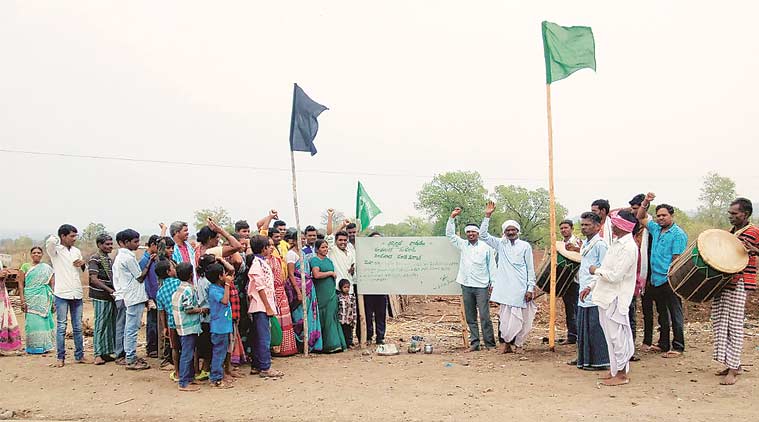 A black flag at one village
A black flag at one village
Trouble is brewing in tribal areas of north Telangana where Adivasis have put up signboards barring Lambadas from entering their villages. They have also raised black flags outside nearly 200 villages, accusing the Telangana government of not heeding their demand to delist Lambadas from the Scheduled Tribes category. In several villages, Adivasi elders have declared “self-rule’’ and have put up boards to that effect with the slogan “Maava Naate, Maava Raj’’ (Our village, our rule).
The villages which have barred Lambada community people from entering are mostly in the tribal-dominated mandals of Adilabad, Utnoor, Jainoor, Sirpur, Narnoor and Gadigude. The “ban” primarily targets teachers of state-run Ashram residential schools, primary and upper primary schools where almost all the teachers are from Lambada community.
“The Lambadas are exploiting the ST quota by usurping all government posts. They have prospered at our expense. Despite being in the ST category, we are unable to take advantage of the quota because Lambadas grab all posts. We demand that they be excluded from the ST list. Only original tribals should be in the ST list. Only then we will benefit,’’ says former MLA Soyam Baburao, who is also president of Adivasi Hakkula Porata Samiti. Baburao said that so far they have peacefully requested the government to fulfill their demands, but it was time to take “harsher measures like banning” Lambadas from tribal areas.
According to B Sanjeev Naik, founder of Lambada outfit Sevalal Sena, Lambada employees from 29 government departments like education, sanitation, revenue, police, agriculture and others have been banned by the Adivasis from entering the “gudems’’ — tribal hamlets. Naik said that in several villages of Narnoor mandal, Adivasis have even started cultivation on lands owned by Lambadas. “Lambadas fear attacks similar to those that took place last December if they protest against the occupation. When they complain to authorities, they are asking for time to settle the issue,” Naik said.
Adde Dinesh, state general secretary of Tribal Teachers’ Union, said Lambadas have been barred from teaching in about 100 schools in 150 tribal areas. “Since June 1, we go to the nearest government office and sign in a register and go home. The gudems have passed resolutions banning us from teaching in schools in their areas. When we go to the schools, they give us a printout of the resolution and ask us to leave. The schools are being run by a few teachers belonging to Adivasi community. We don’t know for how long this will go on,’’ Dinesh said.
The Telangana government, meanwhile, is reluctant to take the controversy head on. Last week, talks between Adivasi leaders and Chief Secretary S K Joshi failed as Adivasis felt that he was unwilling to give an assurance that Lambadas would be delisted from the ST category. Adilabad District Collector D Divya said talks and negotiations with the Adivasis were on and the administration is hoping for a resolution soon.
On May 27, at a meeting of Adivasis at Adilabad, more then 100 Adivasi leaders from various groups decided to declare “self-rule’’ in their villages, citing Article 244 in the Fifth Schedule of Constitution which says tribal-dominated areas can be designated as Scheduled Areas which have power of self governance. On Monday, scores of Adivasi youths took out motorcycle rallies and distributed “self-rule’’ pamphlets at offices of Village Revenue Officers and Mandal Revenue Officers.